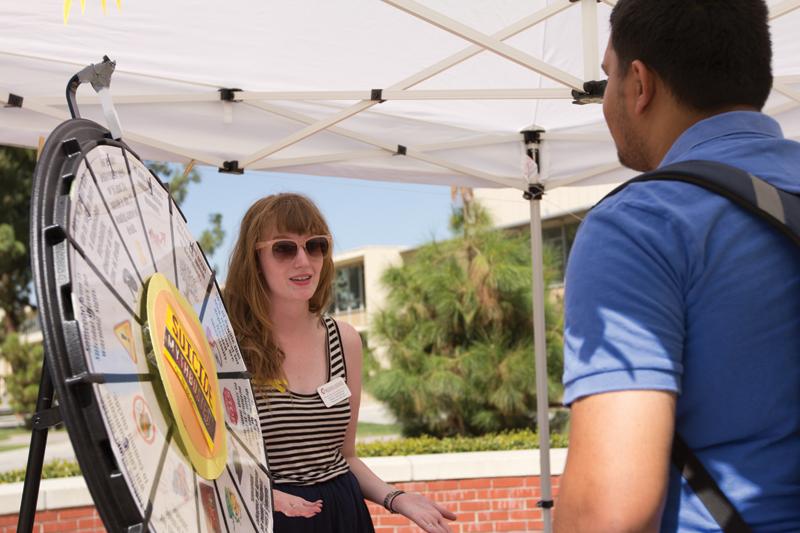Fresno State’s Dr. Robert Maldonado of the philosophy department was part of an interfaith panel discussion held on the eve of the 11th anniversary of the 9/11 terrorist attacks. The discussion was also held in light of the Wisconsin Sikh temple shooting and Missouri Mosque attacks last month.
The Islamic Cultural Center of Fresno and the Interfaith Alliance of California hosted the event, “A Night of Healing,” by bringing together spiritual representatives from various backgrounds in Fresno.
Panelists included Dr. Maldonado from Fresno State’s Philosophy department, Imam Seyed Ali Ghazvini of the Islamic Cultural Center of Fresno; Rev. Bryan Jessup of the Unitarian Universalist Church of Fresno; Dr. Sharnjit Singh Purewall, Assistant Secretary of the Sikh Council of Central California; Rabbi Rick Winer of Temple Beth Israel and Dr. Negin Tahvildary sitting in for Rev. Natalie Chamberlain.
Jim Grant of KNXT acted as moderator for the panel, leading the discussants in a formal conversation regarding race relations and religious tensions in the United States since the 9/11 terrorist attacks.
With their opening statements, panel members each discussed how the ethnic and religious diversity of the United States has come with historical baggage. Each panelist has seen acts of religious intolerance committed against their own.
Maldonado, coming from a background in philosophy and the only panelist not directly affiliated with a religion, came to the discussion from a secular, scholastic stance.
“When I think about hope it often goes with hopeless. But then I think about my own profession, which is academic, and when you think about academics it’s fundamentally a hopeful enterprise,” Maldonado said.
He was also critical of the absence of religious education among American students, and that the lack of interfaith understanding leads to miscommunication which leads to violence.
“What I call the principle of religious-non charity, is that people sometimes, many times, have a tendency to judge their own tradition by its best examples and other people’s traditions by their worst. And so you’re hyper-charitable to your own.”
Rabbi Rick Winer commented on the Jewish perspective on religious intolerance, xenophobia, and the social aftershocks of 9/11.
“I remember as a youngster figuring out okay, what is this xenophobia and I guess it’s just here because we need an ‘X’, but I don’t really know what it means. And as I’ve gotten older, and in recent years I’ve come to appreciate, that we must too, always be careful not to participate as its written in that passage, this xenophobia,” Winer said.
He went to explain, in the time after 9/11, going to a local Indian restaurant in Livermore, and learning that the business had been doing badly since the attacks due to being mistaken for Arab Muslims.
“Someone who is upset at this might lash out at a community who perpetrated this but the Indian community and 9/11””there’s no connection whatsoever. Xenophobia.”
The concept of hope among all attendants was strong, as they sought to communicate that all faiths and traditions essentially teach the same lesson””to find, and create peace. After opening statements, panelists led the room in a hymn for peace before taking questions from the audience.
Several Fresno State students were also on hand for the event.
Bahar Madani, a philosophy and pre-law student, and Mufeed Al Shakori, a mechanical engineering student, volunteered at the Islamic Center.
“This discussion was extremely beneficial not just for students but people of all ages and different cultures and ethnicities because it was a learning experience for all. Everyone needs to see that we can all unite with each other at one location and discuss one another’s religions and cultures and ethnic backgrounds in a peaceful and educational manner,” Madani said.
Madani believed that the university should strive to hold more interfaith panel discussions.
“I think Fresno State should invest some of their time and maybe have an idea like this with maybe younger panelists of different religions.”
Maldonado though believed that while the night’s panel discussions were great, there is still more to be done to reach a wider audience.
“It’s also not enough. We need to just expand the base of conversation because still here, in spite of the significant differences that are present, it’s more like-minded than not and so we have some practice here speaking across difference but its one of the things we can certainly do better.”




